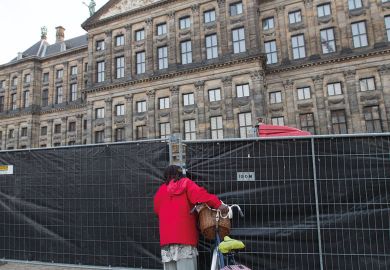Dutch trials of shorter academic years could give staff back a month of research time, but a student organisation has raised concerns about the loss of resits or a cramming of classes into fewer weeks.
A study last year by the Young Academy, part of the Royal Netherlands Academy of Arts and Sciences, found that the average academic year in the country was five-and-a-half weeks longer than a sample of leading institutions abroad.
The academy recommended that the number of teaching and testing weeks be reduced, with fewer resit opportunities. Teaching methods and calendars could also be better adapted to the needs of disciplines and instructors, they said.
Last month, education minister Robbert Dijkgraaf told parliament that universities would be able to bid for shares of a €10 million (£8.7 million) pot to experiment with lighter curricula, with universities invited to host up to three €75,000 pilots.
Pilot universities are invited to change curriculum content or contact hours, hold fewer resits, use more online learning or distribute research work differently.
Jeroen de Ridder, former head of the Young Academy and an associate professor at University Medical Centre Utrecht, said experimenting with a lighter load was worthwhile.
“Imagine you have another month of research time in your year, that sounds pretty significant to me,” he told Times Higher Education.
He said the Netherlands’ longer years were partly explained by a push to shorten undergraduate study, which had in some cases dragged on for up to nine years. A resit-friendly culture also developed to stop students clogging the system, but this may have led to complacency.
“Some of the students will come to the first exam and just see what it looks like, they won’t actually have studied. It’s a sort of mentality issue that’s been created, and it’s a very striking feature of the Dutch system,” Dr de Ridder said.
Many academics would welcome less intense workloads, particularly in the Netherlands, where some have protested against contracts that they say lead to constant overtime, stunting the development of early career researchers.
But the trials face the strongest scepticism from students, who have also campaigned for lighter workloads, but worry that a slimmed-down year will create stress.
The chair of the Dutch National Student Association, Terri van der Velden, questioned how limiting the number of resits would reduce stress but added that it would be “a good thing if this actually leads to more breathing space”.
In his letter to parliament, Professor Dijkgraaf said that halfway through the four-year pilot he would discuss with institutions and student unions how workload and the quality of education were affected by the changes.
Register to continue
Why register?
- Registration is free and only takes a moment
- Once registered, you can read 3 articles a month
- Sign up for our newsletter
Subscribe
Or subscribe for unlimited access to:
- Unlimited access to news, views, insights & reviews
- Digital editions
- Digital access to THE’s university and college rankings analysis
Already registered or a current subscriber?








